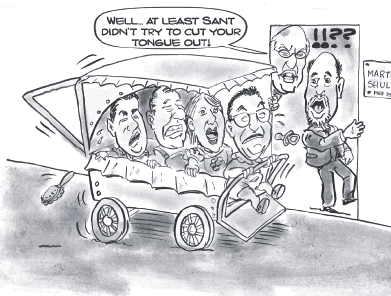
EDITORIAL | Wednesday, 28 May 2008 Wanted: a truly new beginning
To say that the Malta Labour Party is currently in turmoil would be an understatement. In the aftermath of the electoral defeat of March 8, and above all in the vacuum left by a leader who shaped the party’s identity for the past 16 years, it now looks as though Malta’s second largest political movement is gravitating dangerously towards spontaneous combustion.
From this perspective, the decision to publish an internal report into the Labour Party’s electoral defeat – taken amid controversy by the MLP’s national executive – is a milestone in Maltese political history. It was also a courageous move, as given the current explosive atmosphere within the MLP, the contents of the report could only dramatically contribute to the impression of a party about to implode. Deputy leader Michael Falzon, for instance, immediately objected that the report had been biased in his regard, and as a contender for the MLP leadership rushed to make his misgivings public. Added to his outburst against the European Socialists’ MEP chairman Martin Schulz, who last week endorsed Falzon’s rival Joseph Muscat, as well as his astonishing performance on Bondiplus on Monday, and one cannot escape the notion that the Labour Party national executive has finally tired of the childish antics of some of its top officials, and decided to publish the report specifically to precipitate a long overdue change within the MLP’s administrative structures. With the benefit of hindsight, much of the report itself now appears somewhat obvious. For instance, it made mincemeat of the MLP’s celebrated “Pjan Ghal Bidu Gdid” which was then turned into a 100-proposal manifesto that was so chock-full of mistakes and outdated policies, it was never even distributed to households. The entire campaign also cemented the popular perception of a party too fraught with internal dissent, too unsure of its own direction, to successfully project the image that it was capable of taking the country forward. Perhaps the most remarkable aspect of the report was the candid revelation that its predecessor – an unpublished investigation into the 2003 election defeat – contained several important policy recommendations which were never taken on board. These included the creation of a strategy group (as distinct from allowing the leadership to decide strategy in secret and on its own); the decentralisation into an effective network of local and district committees; and above all, the development of a modern identity that could appeal to the traditional non-Labour voter. One could analyse the 2008 report’s observations one by one, but in truth the basic conclusion can be reached even from a cursory glance. The Labour Party needed to radically re-invent itself following its dismal 2003 result. This it failed to do, and the party found itself lumbering towards electoral extinction like the dinosaur it had come to resemble. There is a cautionary tale for all political parties, including the one in government. For Labour’s woes are directly attributable to its inability to shake off the paternalist politics of its erstwhile mentor, Dom Mintoff. Under Alfred Sant, the MLP admittedly moved away from the outright Messianic status enjoyed by Mintoff and Karmenu Mifsud Bonnici. But it remains a fact that the party machinery – so much more powerful today than in the 1970s and 1980s – came to be mobilised purely to keep Alfred Sant at the helm… as was painfully apparent in the aftermath of the 2003 defeat. Every succeeding observation made in the 2008 defeat report is in fact directly traceable to the Malta Labour Party’s inability to shake off the image of an unreliable and unpredictable institution, whose policies were dictated more by a fanatical devotion to its leader, than to any discernable political identity of its own. Now that the report is out in the open, the way forward is likewise visible to all who bother to look. In the wake of its third consecutive defeat – and its sixth since 1981 – the Malta Labour Party seems to have finally awoken to the fact that it needs to change drastically, to come up with serious policies which are attractive to the uncommitted voter, and embrace its European socialist identity – than obstinately cling to policies which had already been roundly rejected in 2003. Whether it will be allowed to do this or not is another question entirely. It is time Labour delegates ask themselves whether they are ready to radicalise and modernise a party that has up to now been exploited by factional groups interested only in consolidating their grip over the party, rather than take Labour into government. Any comments? |
MaltaToday News |
Managing editor Saviour Balzan | Tel. ++356 21382741 | Fax: ++356 21385075 | Email
